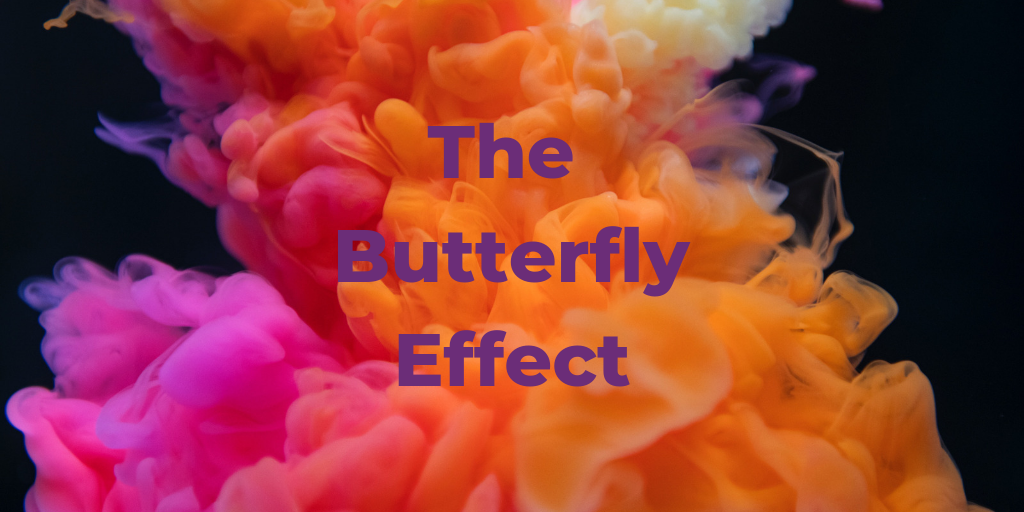
Clare Young, MOM Office Manager talks about the butterfly effect and why it is relevant to the crowded space industry.
You may be wondering why we’re talking about butterflies and how these tiny, elegant and pretty insects could possibly be linked to anything within our industry.
Have you ever wondered why you feel good when you spend the day with a close friend, or conversely feel awful when you spend just 30 minutes on the phone with an aunt who complains endlessly?
Is your day a catalogue of mishaps of arguments with the lady who sold you coffee this morning, a broken mobile phone, a missed appointment…all because of an incorrect bill that arrived in the post, which you read before you went to work, and really annoyed you, but you didn’t have time to make the call to sort it out till tonight?
Many schools of thought believe everything (including us humans) are all interwoven, interconnected and inextricably linked. Indeed, planetary scientists confirm that we are made of star dust and that after the Big Bang everything that ever was, is and will be, came from just two building blocks of matter – quarks and electrons. Who remembers the 2002 Moby song ‘We Are All Made from Stars? He was absolutely right.
So what is the Butterfly Effect and by understanding it, how can it help you to plan your working environment and determine your strategic and operational successes?
The term ‘butterfly effect’ was coined in 1969 by Edward Norton Lorenz, an American mathematician and meteorologist, and evolved out of his earlier work on Chaos Theory. Briefly, Chaos Theory is a branch of mathematics that examines particular systems that are extremely sensitive.
A miniscule change may result in the system displaying over time an entirely different set of behaviours than expected. Chaotic behaviour can be seen in natural systems, for example, weather and climate.
Lorenz used a figurative example of a tornado being affected by tiny agitations, such as the flapping wings of a faraway butterfly many weeks earlier. Mind blowing, isn’t it?
Now, this isn’t a weather report, and I’m not a meteorologist. But over time this term has been used to explain how seemingly small and unrelated events can have a gigantic impact (good or bad). Think of the John Lewis Christmas ad – not every child that receives a piano as a gift will become Elton John, but you get the idea. Similarly, the unrelated events in the movie Babel (starring Brad Pitt and Cate Blanchett) show us, the viewer, who has the benefit of viewing all these lives unfolding simultaneously, how small decisions or actions can alter personal trajectories, with devastating consequences.
Some years ago I kindly gave my fun loving parents a gift experience of white water rafting, they were not ‘young’ at the time but nevertheless enthusiastically agreed to go. Despite being flipped out of the raft and smashing her tooth on a nearby rock my mother (and father) enjoyed the experience immensely. A visit to the dentist solved the tooth issue and that was that.
Some years later my mother developed an abscess under the same tooth that was damaged during her adventure. You’ve probably heard similar stories of abscesses forming after a tooth trauma.
The point is, it often takes years for the abscess to respond…and I still marvel at how this can be, after years of healthy gums and (hopefully) no other issues. Slowly, quietly, a creation is taking place, until BAM! Excruciating, breath-taking pain, searing through your mouth. And it takes a while, but eventually we remember what happened all those years ago when we hurt the tooth.
It was widely agreed that it was impossible for any human to break the 4-minute mile barrier. Nobody broke it until Roger Bannister came along. Once his task was completed numerous runners also started to break the 4-minute mile barrier. Why? Because simply by hearing the news of Roger’s success, they believed it was possible for them to do it too.
So the conclusion, small actions have the potential to create dramatic changes elsewhere, seemingly unrelated. But it doesn’t have to end there.
We can use this apparently insignificant concept and use it to shape our work ethic, our teams, our business and ultimately the lives of many. And before you start thinking one person can’t make a difference think Ghandi, Martin Luther King, Marilyn Monroe, Bill Gates, Hitler, Margaret Thatcher…
And so it is in our industry. Months of preparation, run-throughs and on the day, a fine balance of a stack of decisions, sometimes made at lightning speed in the midst of an emergency.
We may not identify that one thing that averted an incident or the thing we didn’t do that compounded a problem until a crisis broke out. The impact of your investment may not always be obvious, but the absence of organisational problems is probably a good start. We plan, prepare, train and educate to reduce the chances of negative effects.
How are your leadership skills? Is your staff training up to date? Was that key decision made at the right time?
We know events are unpredictable. Not one single occurrence may be the cause, but a chain of events that lead to potentially cataclysmic consequences. Not wanting to overdramatise, but we have an important job and done right we will enjoy event after event with the fewest problems possible. We plan for every eventuality so we’re prepared. There is no such thing as over-planning or over-preparing. The more we know our scenarios, the more we become immersed in them and the more we are able to respond in the most effective way. Lives depend on it.
#butterflyeffect #crowdedspace #eventsafety #eventplanning #eventmanagement
